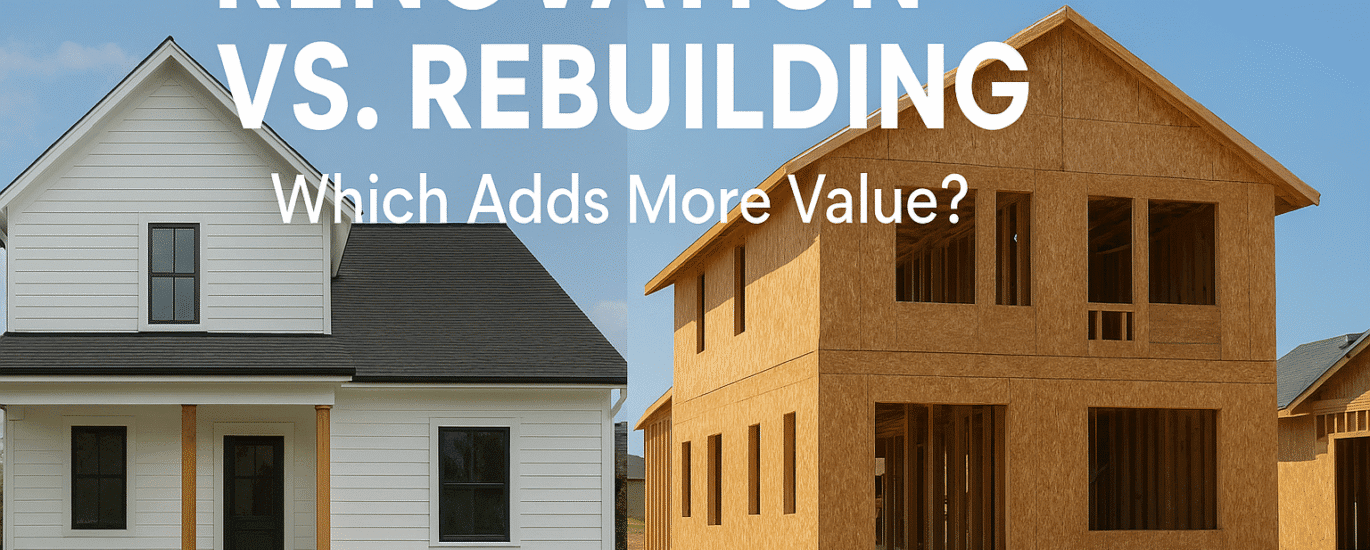Table of Contents
Rebuilding is often seen as the ultimate way to transform a property, but homeowners and investors frequently struggle to decide whether it truly adds more value than renovation. Both approaches can enhance a property’s worth, but the right choice depends on your goals, budget, and the long-term potential of the site. Understanding the difference between renovating and rebuilding can help you make a decision that maximizes value, functionality, and market appeal.
What Is Renovation?
Renovation involves upgrading, repairing, or modernizing an existing structure without altering its fundamental framework. Common renovation projects include updating interiors, improving kitchens and bathrooms, enhancing energy efficiency, or restoring damaged parts of the property. Renovations are often less disruptive, cost-effective, and quicker to complete than a full rebuild.
For example, if a home has strong structural bones but feels outdated, a renovation can breathe new life into the space. Cosmetic upgrades like fresh paint, flooring replacement, and lighting installations immediately improve aesthetics, while functional improvements such as energy-efficient windows or new plumbing systems increase long-term value. Renovation allows you to maintain the original character of a property while adapting it to modern needs.
What Is Rebuilding?
Rebuilding is a complete tear-down and reconstruction of a property from the ground up. This option is typically chosen when the existing structure is severely damaged, outdated, or incapable of supporting the owner’s vision. Rebuilding provides a blank canvas to design a home or building that perfectly aligns with modern standards, sustainability goals, and lifestyle requirements.
While rebuilding demands higher costs, longer timelines, and more planning approvals, it often delivers unmatched benefits. A rebuilt property can incorporate cutting-edge technology, improved layouts, and energy-efficient systems that substantially increase long-term value. Rebuilding is especially advantageous when land value is high but the existing property design no longer appeals to modern buyers or renters.
Cost Considerations: Renovation vs. Rebuilding
One of the most important factors in the decision-making process is cost. Renovations usually require a smaller upfront investment, making them attractive for budget-conscious homeowners. Minor upgrades like new fixtures or fresh finishes can instantly improve a property’s value without significant disruption.
Rebuilding, however, involves extensive costs, including demolition, architectural design, permits, and full-scale construction. Despite the higher price tag, rebuilding may yield a greater return on investment in areas where modern, energy-efficient homes command higher market demand. In booming urban markets, for instance, a newly rebuilt property often sells at a premium compared to older, renovated ones.
Long-Term Value: Which Wins?
When comparing renovation and rebuilding, value is not just about immediate resale price—it’s about long-term potential. Renovations may boost value in the short term, but they often come with limitations. The existing structure can restrict design choices, and older foundations may still carry hidden maintenance risks.
Rebuilding, on the other hand, eliminates these challenges by starting fresh. Buyers tend to favor brand-new properties because they promise lower maintenance, better efficiency, and modern design. While rebuilding requires patience and investment, it often results in a property that retains higher value for decades.
Environmental and Sustainability Factors
Another important consideration is sustainability. Renovations can be eco-friendly by preserving existing structures and reducing construction waste. Simple upgrades like installing solar panels, energy-efficient appliances, or water-saving systems can enhance value without harming the environment.
Rebuilding, however, opens opportunities for full-scale sustainable design. From advanced insulation and renewable energy systems to green building certifications, rebuilding allows owners to create future-ready properties. For eco-conscious buyers, a fully rebuilt, energy-efficient property may command a significant market advantage.
Market Appeal and Lifestyle Fit
Lifestyle also plays a role in the decision. Renovations are suitable for those who want to maintain the charm of a property while making functional upgrades. For example, preserving heritage homes with modern interiors often appeals to niche buyers.
Rebuilding caters to individuals seeking custom designs, modern layouts, and innovative features. Open-concept spaces, smart home systems, and luxury amenities are far easier to achieve in a new build than within the constraints of an older structure. If your target market values modern convenience over historical character, rebuilding is often the more appealing option.
Making the Right Choice
Ultimately, the decision between renovation and rebuilding depends on your priorities. If budget, timelines, and preserving character are important, renovation is the better choice. If maximizing long-term value, sustainability, and modern appeal is the goal, rebuilding offers unmatched opportunities.
Before making a decision, conduct a cost-benefit analysis, consult real estate professionals, and evaluate neighborhood trends. Sometimes, the land value itself justifies a rebuild, while in other cases, a tasteful renovation is enough to stand out in the market.
Conclusion
Rebuilding may sound like a drastic choice, but in many cases, it delivers the highest long-term value. Renovations provide short-term affordability and improvements, but rebuilding unlocks opportunities for modern design, sustainability, and higher resale potential. By carefully assessing your property’s condition, financial capacity, and market trends, you can determine which path will add more value and set your investment up for success.
✅ Ready to Make the Smart Move?
Explore our latest smart home listings or book a free consultation with a Heptagon advisor today. Let’s help you find a home that’s not just modern—but future-ready.
Call us: +971 50 203 5824
Email: info@heptagonproperties.com
Website: https://heptagonproperties.com
Check out our contracting company: https://charminardubai.com/
Follow us on Instagram | LinkedIn | YouTube | Facebook | Tiktok
Frequently Asked Questions (FAQs) Questions (FAQs)
Is rebuilding always more expensive than renovation?
Yes, in most cases rebuilding costs more because it involves demolition, new construction, permits, and design fees. However, it can deliver higher returns in the long run if the land value and market demand support a new build.
Does renovating increase property value?
Absolutely. Renovations such as modern kitchens, bathrooms, and energy-efficient upgrades can significantly raise a property’s resale value. However, the increase may be limited by the age and condition of the existing structure.
How do I decide between renovation and rebuilding?
Consider your budget, timeline, property condition, and long-term goals. If the foundation and structure are strong, renovation may be enough. If the property is outdated or structurally weak, rebuilding could be the better investment.
Which option is better for sustainability—renovation or rebuilding?
Renovation is generally more eco-friendly since it reduces construction waste by preserving existing structures. However, rebuilding allows for a completely sustainable design using modern materials and renewable energy systems.
Does rebuilding guarantee a higher resale price?
Not always. While rebuilt homes often command a premium, factors such as neighborhood demand, design quality, and market timing all influence resale value. A poorly planned rebuild may not deliver the expected returns.





